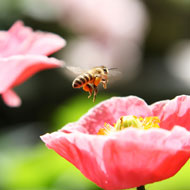Bees are ‘able to understand zero as a number’

Young children learn the number zero later than others and often struggle to understand whether it is more or less than one.
A new study suggests bees are the first known invertebrate to understand the concept of ‘zero’, the New Scientist reports.
Zero can be tricky even for humans, with young children learning this number later than others and often struggling to understand whether it is more or less than one. Studies have shown chimpanzees and monkeys can also be taught to consider zero a quantity.
Bees have surprising well developed number skills and previous research suggests they can be taught to count to four. Researchers from RMIT University in Melbourne say their work suggests bees also recognise zero as a number.
In an initial study, bees were trained to differentiate between two numbers. Scientists set up two platforms carrying one to four shapes. The platform with fewer shapes had a sweet sucrose reward, while the other had a nasty-tasting quinine solution. They were taught to associate the platform with fewer shapes until they chose the right one 80 per cent of the time. Researchers then put the bees through further tests with differently shaped objects, to confirm they were responding to the number of shapes, not their appearance.
When given a choice between zero shapes and two or three shapes, bees picked zero most of the time.
In the second experiment, the bees were trained in the same way, but this time had to land on a platform with zero or 1-6 objects. They consistently chose zero, but were less accurate and took longer to decide when the other option was one rather than six.
Speaking at the Behaviour Conference in Portugal, researcher Scarlett Howard said these findings suggest that bees understand zero as a number, and their comprehension is similar to some humans and chimps - though it is not clear why.



 The Veterinary Medicines Directorate (VMD) is inviting applications from veterinary students to attend a one-week extramural studies (EMS) placement in July 2026.
The Veterinary Medicines Directorate (VMD) is inviting applications from veterinary students to attend a one-week extramural studies (EMS) placement in July 2026.